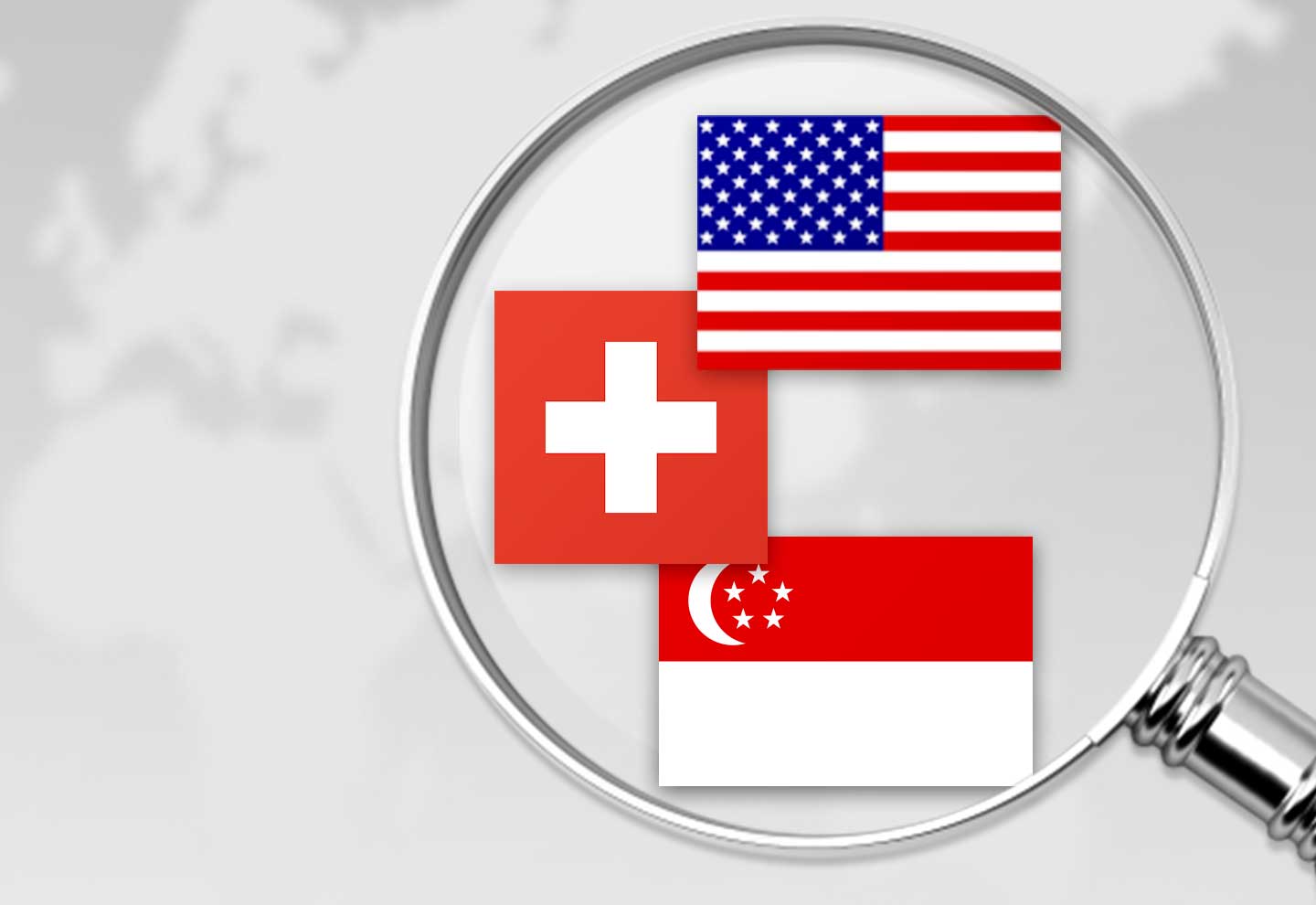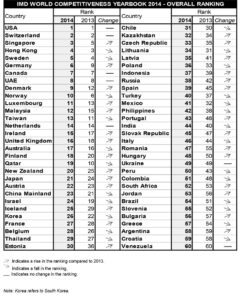
IMD releases its 2014 World Competitiveness Yearbook ranking
A country’s image abroad can also influence future competitiveness
LAUSANNE, SWITZERLAND (May 2014): IMD, a top-ranked global business school based in Switzerland, today announced its annual world competitiveness ranking. As part of its ranking of 60 economies for 2014, the IMD World Competitiveness Center also looks at perceptions of each country as a place to do business.
“The overall competitiveness story for 2014 is one of continued success in the US, partial recovery in Europe, and struggles for some large emerging markets,” said Professor Arturo Bris, Director of the IMD World Competitiveness Center. “There is no single recipe for a country to climb the competitiveness rankings, and much depends on the local context.”
Highlights of the 2014 ranking
The US retains the No. 1 spot in 2014, reflecting the resilience of its economy, better employment numbers, and its dominance in technology and infrastructure.
There are no big changes among the top ten. Small economies such as Switzerland (2), Singapore (3) and Hong Kong (4) continue to prosper thanks to exports, business efficiency and innovation.
Europe fares better than last year, thanks to its gradual economic recovery. Denmark (9) enters the top ten, joining Switzerland, Sweden (5), Germany (6) and Norway (10). Among Europe’s peripheral economies, Ireland (15), Spain (39) and Portugal (43) all rise, while Italy (46) and Greece (57) fall.
Japan (21) continues to climb in the rankings, helped by a weaker currency that has improved its competitiveness abroad. Elsewhere in Asia, both Malaysia (12) and Indonesia (37) make gains, while Thailand (29) falls amid political uncertainty.
Most big emerging markets slide in the rankings as economic growth and foreign investment slow down and infrastructure remains inadequate. China (23) falls, partly owing to concerns about its business environment, while India (44) and Brazil (54) suffer from inefficient labor markets and ineffective business management. Turkey (40), Mexico (41), the Philippines (42) and Peru (50) also fall.

Research Information & Knowledge Hub for additional information on IMD publications

Global trade is re-wiring without the US leading to the rise of new trade coalitions according to trade experts from IMD and the Hinrich Foundation.

Efficiency once defined competitiveness but resilience and trust now lead. David Bach shows why Europe’s leaders need optimism to unlock both.
Moving the cogs in a country’s productivity system requires the right kind of talent. Let’s consider them the oil. The usefulness of this oil depends on all manner of inputs, such as the quality of the education system and the attractiveness of th...

This book is a vindication of Europe. It challenges the view of Europe as a tired, overregulated continent, arguing instead that Europe has emerged from decades of crisis—financial turmoil, Brexit, COVID-19, war in Ukraine—as a resilient, reformed...
When policymakers start using internet slang to describe the economy, it is a sign something is not right. The word neijuan was once used by Chinese students to depict burnout from seemingly pointless competition. Now it is showing up in policy la...

At the Salzburg Summit, leaders called for a more competitive, confident Europe, backed by strategic autonomy, defense readiness, and regulatory reform.
South Korea has long been recognized for its advanced manufacturing industry and high research and development (R&D) investment, but it now faces complex issues that threaten its competitiveness. This is evident in the 2025 IMD World Competitivene...

Corporate leaders must stop being passive spectators and actively shape geopolitical outcomes to drive global competitiveness and collaboration.

The IMD World Competitiveness Ranking (WCR) is a renowned tool for assessing the competitiveness of economies worldwide. This year, IMD’s World Competitiveness Center (WCC) has expanded its scope to include Kenya, Namibia, and Oman. This year's ra...

L’Oréal Sustainability lead Kiri Trier shares how she’s shifting customer behavior to make recycling, refilling, and waste reduction a bathroom habit.
Research Information & Knowledge Hub for additional information on IMD publications
Research Information & Knowledge Hub for additional information on IMD publications
IMD World Competitiveness Center Report, September 2025
Research Information & Knowledge Hub for additional information on IMD publications
Research Information & Knowledge Hub for additional information on IMD publications
Research Information & Knowledge Hub for additional information on IMD publications
Research Information & Knowledge Hub for additional information on IMD publications
in Maeil Business Newspaper 16 July 2025
Research Information & Knowledge Hub for additional information on IMD publications
Research Information & Knowledge Hub for additional information on IMD publications
Published by International Institute for Management Development ©2025
Research Information & Knowledge Hub for additional information on IMD publications
in I by IMD
Research Information & Knowledge Hub for additional information on IMD publications

